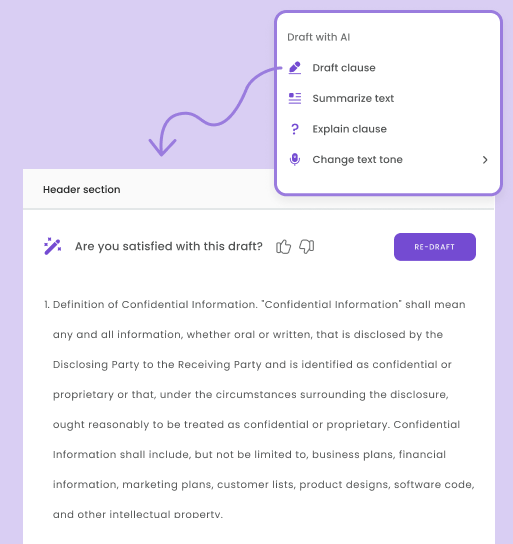When you sign a contract, you want it to succeed.
You want the deliverables to be sent, the quality to be up to standard, and for payments to be made on time.
Unfortunately, things don’t always work out for one reason or another which leads to disputes and using arbitration agreements.
This guide focuses on what an arbitration agreement is, its core elements, the benefits it brings, and more.
Understanding Arbitration
Arbitration is a method of resolving disputes outside the traditional court system. You agree to submit your disagreement to an impartial third party, known as an arbitrator or panel of arbitrators.
This process results in a binding decision, akin to a court judgment, which you are obligated to adhere to.
Unlike litigation, which involves resolving disputes in a courtroom setting with a judge or jury, arbitration offers a more flexible and tailored approach to dispute resolution.
Comparison Between Arbitration and Litigation:
Arbitration differs from litigation in several key respects. While both methods aim to resolve legal disputes, arbitration takes place outside of the formal court system and offers greater control over the dispute resolution process.
Unlike litigation, which is governed by strict procedural rules and conducted per legal statutes and case law, arbitration proceedings are more flexible and informal, with fewer procedural formalities and opportunities for delay.
Additionally, arbitration awards are generally final and binding, with limited opportunities for appeal, whereas court judgments in litigation may be subject to multiple appeals.
This finality can provide you with certainty and closure, albeit with fewer opportunities for recourse in the event of an unfavorable outcome.
Furthermore, arbitration offers you the benefits of confidentiality and specialized decision-making, as arbitrators are often chosen for their expertise in the subject matter of the dispute.
However, arbitration also has its limitations, including concerns about due process and the protection of procedural rights, particularly in cases where one party may hold a significant power imbalance over the other.
What is an Arbitration Agreement?
An arbitration agreement is a contractual arrangement between parties involved in a legal relationship, wherein they agree to resolve any disputes that may arise through arbitration rather than through traditional litigation in court.
This agreement typically outlines the terms and conditions under which arbitration will be conducted, including the selection of arbitrators, the rules and procedures governing the arbitration process, and the location where the arbitration will take place.
By entering into an arbitration agreement, you voluntarily waive your right to pursue legal action in court and instead commit to resolving your disputes through arbitration.
Types of Disputes Covered by Arbitration Agreements:
Arbitration agreements can cover a wide range of disputes, including commercial disputes, contractual disputes, employment disputes, construction disputes, and consumer disputes, among others.
These agreements are commonly used in business-to-business contracts, employment contracts, construction contracts, and consumer contracts, where parties may seek to avoid the uncertainties and complexities of litigation.
The types of disputes covered by arbitration agreements will depend on the language and scope of the agreement itself. You can specify the types of disputes that are subject to arbitration and may choose to exclude certain types of claims or disputes from arbitration.
However, arbitration agreements are generally construed broadly, and courts will typically enforce arbitration agreements according to their terms, provided that they are valid and enforceable under applicable law.
Elements of an Arbitration Agreement
Several essential elements contribute to the clarity, effectiveness, and enforceability of an arbitration agreement.
Parties Involved:
The arbitration agreement must identify the parties involved and specify their consent to resolve disputes through arbitration.
This includes the primary parties to the agreement and any affiliates, subsidiaries, successors, or assigns that the arbitration clause may bind.
Clear identification of the parties helps ensure that all relevant entities are subject to the arbitration agreement and can be held accountable for its terms.
Scope of Disputes:
Defining the scope of disputes covered by the arbitration agreement is crucial to avoiding ambiguity and potential disputes over the arbitrability of certain claims.
The agreement should specify the types of disputes subject to arbitration, such as contractual disputes, tort claims, or statutory claims.
You may choose to include broad language encompassing all disputes arising out of or relating to the underlying agreement, or they may opt to narrow the scope to specific types of claims.
Clarity regarding the scope of disputes helps ensure that parties understand the extent of their obligations under the arbitration agreement.
Arbitration Rules and Procedures:
Arbitration agreements typically incorporate the rules and procedures of a recognized arbitration institution or set out specific rules for governing the arbitration process.
These rules govern various aspects of the arbitration, including the appointment of arbitrators, the conduct of hearings, the exchange of evidence, and the issuance of awards.
By establishing the rules and procedures upfront, you can streamline the arbitration process, promote efficiency, and minimize potential disputes over procedural matters.
Choice of Arbitrator(s):
The arbitration agreement should outline the criteria for selecting arbitrators and specify the process for appointing them.
This may include requirements regarding the qualifications, expertise, and impartiality of arbitrators, as well as procedures for resolving disputes over the selection of arbitrators.
You may choose to appoint a single arbitrator or a panel of arbitrators, depending on the complexity of the dispute and your preferences. Clear guidelines for selecting arbitrators help ensure the integrity and fairness of the arbitration process.
Governing Law and Jurisdiction:
Arbitration agreements often specify the governing law and jurisdiction applicable to the arbitration proceedings.
This includes identifying the substantive law governing the underlying agreement, as well as the procedural law governing the arbitration process itself.
Additionally, you may designate the seat or legal place of arbitration, which determines the procedural rules and supervisory authority governing the arbitration.
Clarity regarding the governing law and jurisdiction helps provide certainty and predictability to the arbitration process and facilitates the enforcement of arbitration awards.
Benefits of Arbitration Agreements
Arbitration agreements offer several advantages over traditional litigation, making them an attractive option for those seeking to resolve disputes efficiently and effectively.
Confidentiality:
One of the most significant benefits of arbitration agreements is the assurance of confidentiality throughout the dispute resolution process.
This confidentiality is particularly valuable for you if you’re seeking to protect sensitive business information, proprietary trade secrets, or personal matters from public disclosure.
By preserving privacy and discretion, arbitration agreements allow you to resolve disputes discreetly and without the risk of damaging your reputation or competitive advantage.
Efficiency:
Arbitration agreements offer a more streamlined and efficient alternative to traditional litigation, allowing you to resolve disputes in a timelier manner.
Arbitration proceedings are typically faster than court proceedings, with fewer procedural formalities, pre-trial motions, and delays.
You can bypass lengthy court schedules and procedural rules, enabling you to move swiftly from the initiation of the arbitration process to the resolution of the dispute.
This efficiency saves time and reduces the costs associated with prolonged litigation, such as attorney fees, court expenses, and administrative overhead.
By expediting the dispute resolution process, arbitration agreements enable parties to focus their resources on their core business activities and objectives.
Flexibility:
Arbitration agreements offer you greater flexibility and control over the dispute resolution process. You’re able to tailor the arbitration proceedings to your specific needs and preferences.
Unlike court litigation, which is subject to rigid procedural rules and statutory requirements, arbitration allows you to customize various aspects of the arbitration process.
This includes the selection of arbitrators, the rules and procedures governing the arbitration, and the location and timing of hearings.
This flexibility enables you to choose arbitrators with expertise in the subject matter of the dispute, select arbitration rules that align with your preferences, and schedule hearings at convenient times and locations.
By accommodating the unique circumstances and priorities of the parties involved, arbitration agreements foster a more collaborative and constructive approach to resolving disputes.
Finality:
Arbitration agreements provide you with a final and binding resolution to their disputes, thereby promoting certainty and closure.
Unlike court judgments, which may be subject to multiple layers of appeal and prolonged legal proceedings, arbitration awards are generally conclusive and enforceable, with limited grounds for challenging or overturning the decision.
This finality allows you to move forward with confidence, knowing that the arbitration award will be upheld and enforced by courts, both domestically and internationally.
By ensuring the enforceability of arbitration awards, arbitration agreements provide you with a reliable and effective mechanism for resolving disputes and achieving closure.
Enforceability of Arbitration Agreements
Arbitration agreements are subject to both national and international legal frameworks, which govern their enforceability and validity.
At the national level, countries typically have legislation that outlines the legal requirements and procedures for enforcing arbitration agreements.
Additionally, international conventions, such as the United Nations Convention on the Recognition and Enforcement of Foreign Arbitral Awards (the New York Convention), provide a framework for the recognition and enforcement of arbitration agreements across borders.
Legal Framework:
National laws vary in their treatment of arbitration agreements, but many jurisdictions have adopted the principles of the UNCITRAL Model Law on International Commercial Arbitration or similar legislation to regulate arbitration.
These laws establish the legal framework for the formation, validity, and enforcement of arbitration agreements within the jurisdiction.
International conventions, such as the New York Convention, provide a uniform mechanism for the recognition and enforcement of arbitration agreements and awards in signatory countries, facilitating the enforcement of arbitration agreements across borders.
Requirements for Enforceability:
For an arbitration agreement to be enforceable, it must meet certain validity criteria established by national law or international conventions.
These criteria typically include elements such as the agreement of the parties to submit their disputes to arbitration, the clarity and specificity of the arbitration clause, and the absence of any harmful factors, such as fraud, duress, or unconscionability.
Additionally, the arbitration agreement must comply with any formalities required by law, such as the requirement for a written agreement in some jurisdictions.
Failure to satisfy these validity criteria may render the arbitration agreement unenforceable and subject to challenge.
Challenges to Enforcement:
Despite the legal framework supporting arbitration agreements, challenges to their enforcement can arise due to various factors. Common obstacles include disputes over the existence or scope of the arbitration agreement, allegations of procedural irregularities or unfairness in the arbitration process, and challenges to the arbitrator’s jurisdiction or authority.
Additionally, parties may seek to resist the enforcement of arbitration agreements by raising legal defenses or counterclaims, such as claims of incapacity, illegality, or frustration of purpose.
Resolving these challenges often requires judicial intervention to determine the validity and enforceability of the arbitration agreement as per applicable law and legal principles.
The enforceability of arbitration agreements depends on compliance with national and international legal frameworks, adherence to validity criteria, and resolution of any challenges or obstacles that may arise during the enforcement process.
Despite potential challenges, arbitration agreements remain a widely accepted and effective means of resolving disputes, offering parties a flexible and reliable alternative to traditional litigation.
Conclusion
Arbitration agreements are useful tools when you don’t want a potential dispute to turn into long-lasting legal battle.
You have much control over how the arbitration process goes, who presides over the arbitration, and many other factors.
The key is to craft the arbitration agreement in a way that enforces a fair judgment within the framework of the requirements you establish.
If you want to speed up the process of creating arbitration agreements, let me know in the comments, and don’t forget to share.




